Insta
Plugging Loopholes: India, US Sign Pact To Increase Collaboration Against Tax Evasion By MNCs

US President Donald Trump and Prime Minister Narendra Modi in Washington. (Mark Wilson/Getty Images)
India and the US on Wednesday (27 March) signed a pact to facilitate the exchange of country-by-country (CbC) report which will promote transparency and prevent tax evasion by subsidiaries of multinational corporations (MNCs), reports The Hindu BusinessLine (BL).
The agreement was signed between Chairman, Central Board of Direct Taxes (CBDT), P C Mody and US Ambassador to India, Kenneth I Juster. Along with the agreement to exchange of CbC reports, the two sides also signed the Bilateral Competent Authority Arrangement. Together they will enable India and the US to automatically exchange the reports filed by the ultimate parent entities of MNCs in their respective jurisdictions belonging to the years commencing on or after January 1, 2016.
Thus subsidiaries of US-headquartered companies in India will not have to locally file CbC Reports, thereby reducing compliance burden. The same also holds true for subsidiaries of Indian companies in the US.
National Leader, Transfer Pricing, EY India, Vijay Iyer, said that the move revalidates the willingness of Indian and US tax authorities to engage and amicably resolve issues for taxpayers.
Issues Remain
However, all is not well between the two countries on trade-related issues. Recently US Trade Representative Robert Lighthizer, under direction from President Donald Trump, announced that the US plans to end India's preferential trade status.
India is the world's largest beneficiary of the Generalized System of Preferences (GSP) programme and also has a trade surplus of nearly $23 billion with the US. Under the United States GSP program, certain products from developing countries like India can be exported to the United States duty-free if that country meets the eligibility criteria established by the US Congress.
Introducing ElectionsHQ + 50 Ground Reports Project
The 2024 elections might seem easy to guess, but there are some important questions that shouldn't be missed.
Do freebies still sway voters? Do people prioritise infrastructure when voting? How will Punjab vote?
The answers to these questions provide great insights into where we, as a country, are headed in the years to come.
Swarajya is starting a project with an aim to do 50 solid ground stories and a smart commentary service on WhatsApp, a one-of-a-kind. We'd love your support during this election season.
Click below to contribute.
Latest